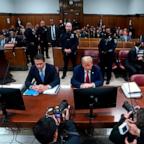Miss. Church Burning Comes Amid 'Increasingly Inflammatory' Campaign Rhetoric
"Vote Trump" graffiti was spray-painted on the church before it was set on fire.
— -- The "Vote Trump" graffiti that was spray-painted on a black church in Mississippi is being investigated as a possible hate crime and raises questions of whether the rhetoric on the campaign trail has inspired some to act violently.
The century-old Hopewell Missionary Baptist Church in Greenville, Mississippi, was vandalized and set on fire Tuesday night. Police are investigating who was responsible.
While political experts are careful not to make a formal connection between the presidential campaigning and the incident, they concede that the tone of this election has reached record lows.
"We've got increasingly inflammatory rhetoric, much of which has a racist, sexist, nativist tone to it. I just don't think there's any doubt about that, and I don't think it's just the candidates. It's clearly permeating many citizens as well," said Dan Tokaji, a law professor at Ohio State University.
Donald Trump's campaign put out a statement on Wednesday condemning "this terrible act that has no place in our society."
According to Tokaji, it is impossible and imprudent to point to the Trump campaign rhetoric as the cause of violence such as the burning of the Mississippi church. But "that doesn't mean [Trump] is not responsible, I suppose," he added.
"I think the level of acrimony in this political campaign is, unfortunately, reflective of the polarization we've seen in recent years," he said.
The FBI is investigating the fire at Hopewell to see if there were any civil rights violations.
It is also in the process of compiling stats for hate crimes in the U.S. this year.
The Southern Poverty Law Center, a hate-group-monitoring organization, noted earlier this year that the number of active hate groups in the U.S. jumped from 784 groups in 2014 to 892 groups in 2015 — which included at least several months of presidential campaigning — about a 14 percent increase.
The Alabama-based SPLC says the terrorist attacks in the U.S. in 2015, such as the attack at a historic black church in Charleston, South Carolina, and the shooting in San Bernardino, California, contributed to the increase.
Heidi Beirich, the director of the SPLC's Intelligence Project, which tracks hate groups, told ABC News that she has seen the racist website The Daily Stormer spawn "book clubs" that essentially serve as chapters for the site's followers.
"That site in the last year has launched an organization, essentially," she said of the group, which espouses neo-Nazi and white supremacist beliefs.
"There's dozens of these chapters all over the year, and that's a new thing, and that will add to the hate list," she said.
Tokaji said that, despite the attacks on the Mississippi church and on a North Carolina GOP office in October, the rhetoric of the campaign was worse earlier on.
"The ratcheting up of the rhetoric, I actually think, was worse in the primary campaign because of the group of voters that Trump was competing for. If anything, it might have been ratcheted down a little bit in the general election," he said.
James Campbell, a professor at the University of Buffalo in New York whose book "Polarized: Making Sense of a Divided America" was published this summer, said that the negative and hurtful rhetoric of the campaign season will continue past Nov. 8.
"This is a very, very bitterly fought election, and the conflict involved in it will not end with the counting of the ballots. The nation is highly polarized, and we have two very polarizing and very disliked candidates," he told ABC News.




